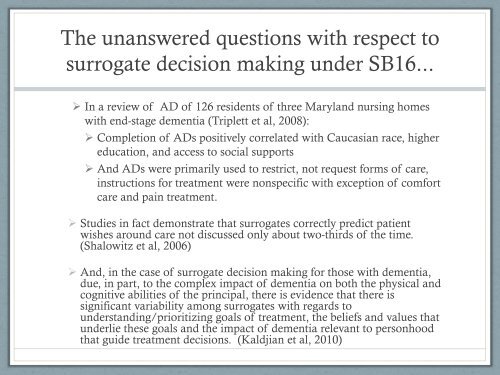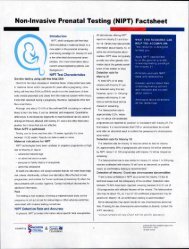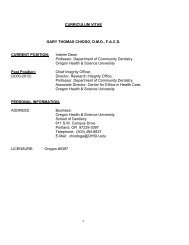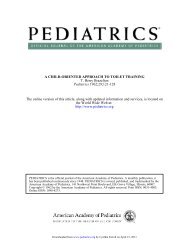(Involuntary) Psychiatric treatment of geriatric patients ... - OHSU Home
(Involuntary) Psychiatric treatment of geriatric patients ... - OHSU Home
(Involuntary) Psychiatric treatment of geriatric patients ... - OHSU Home
Create successful ePaper yourself
Turn your PDF publications into a flip-book with our unique Google optimized e-Paper software.
The unanswered questions with respect to<br />
surrogate decision making under SB16...<br />
In a review <strong>of</strong> AD <strong>of</strong> 126 residents <strong>of</strong> three Maryland nursing homes<br />
with end-stage dementia (Triplett et al, 2008):<br />
Completion <strong>of</strong> ADs positively correlated with Caucasian race, higher<br />
education, and access to social supports<br />
And ADs were primarily used to restrict, not request forms <strong>of</strong> care,<br />
instructions for <strong>treatment</strong> were nonspecific with exception <strong>of</strong> comfort<br />
care and pain <strong>treatment</strong>.<br />
Studies in fact demonstrate that surrogates correctly predict patient<br />
wishes around care not discussed only about two-thirds <strong>of</strong> the time.<br />
(Shalowitz et al, 2006)<br />
And, in the case <strong>of</strong> surrogate decision making for those with dementia,<br />
due, in part, to the complex impact <strong>of</strong> dementia on both the physical and<br />
cognitive abilities <strong>of</strong> the principal, there is evidence that there is<br />
significant variability among surrogates with regards to<br />
understanding/prioritizing goals <strong>of</strong> <strong>treatment</strong>, the beliefs and values that<br />
underlie these goals and the impact <strong>of</strong> dementia relevant to personhood<br />
that guide <strong>treatment</strong> decisions. (Kaldjian et al, 2010)
















